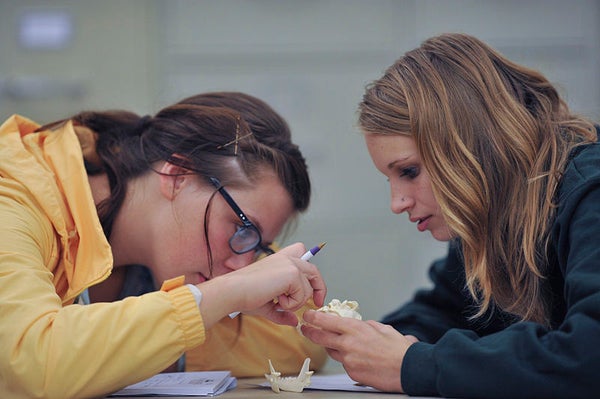This article was published in Scientific American’s former blog network and reflects the views of the author, not necessarily those of Scientific American

By roanokecollege - Virginia Museum of Natural History Uploaded by AlbertHerring, CC BY 2.0, https://commons.wikimedia.org/w/index.php?curid=29696908
As I’ve written here before, natural history has been in decline in the Ivory Tower for decades. Elbowed out by newer, sexier molecular, computational, and statistical studies, biology textbooks have dropped natural history content at the same time that universities have dropped natural history courses.
A new study published in BioScience documents the impact this has had on environmental scientists – at least in California. Although hundreds of both early and late career scientists there surveyed in fields from plant pathology to geophysics consider natural history to be an essential part of their disciplines – 93.45% of early-career scientists and 97.3% of seasoned professionals agreed natural history was “relevant to science today” and 96.75% and 92.95%, respectively, said it was “essential” or “desirable” to their research -- young scientists feel under-trained and often unprepared to teach natural history classes of their own.
On supporting science journalism
If you're enjoying this article, consider supporting our award-winning journalism by subscribing. By purchasing a subscription you are helping to ensure the future of impactful stories about the discoveries and ideas shaping our world today.
Of the 212 early-career scientists surveyed in the Golden State, 80.2% said their research could benefit from more training in natural history – training that is increasingly scarce. The number of formal natural-history courses taken influenced whether a respondent felt adequately exposed to natural history knowledge. And just 16.5% of those respondents felt “confident” they could teach a course in natural history, though another 37.75 felt they “probably could”. That is, only 54% of environmental scientists felt close to adequately trained to teach a natural history course.
As the faculty capable of teaching such courses have retired, are the next generation stuck in a vicious cycle, feeling hesitant to teach natural history themselves but unable to acquire that knowledge?
As the authors note in their introduction, natural-history courses have often opened the eyes of students on other trajectories to the mysteries and richness of the natural world and redirected them into careers in a host of environmental sciences. Such immersive, detailed study of the natural world has also informed the higher-level theories of a long list of eminent biologists, not least Darwin, Wallace, Carson and Wilson. As I’ve written, many scientists have long lamented the drop in support by universities for natural history in all its forms. Meanwhile, kids are herded inside or into fenced, sterile backyards by helicopter parents loath to let them wander unsupervised in nature. Or they're stuck in urban natural history deserts without easy access to woods or meadows where they can acquire a passion for and skills in natural history on their own.
Without a deep understanding of the natural world built on both formal natural history instruction and hours spent outside, will we lose the penetrating insights generated by scientists brought up with such training, these authors ask?
They also wonder the harm that may be done by emphasizing – almost to the exclusion of anything else -- the churning out of important publications and the landing of fat grants in job hiring decisions. They muse, “When can any of us recall a job posting for an academic, tenure-track faculty position that mentioned a transdisciplinary background in natural history as a selection criterion? That omission may exclude those self-identified naturalists and in doing so may be affecting our field in ways we have yet to fully understand.”
“The discussion is far from over, but we wonder whether the recent and current university hiring objectives are handicapping a generation of early-career scientists who are not being taught the value and skills encompassing natural history and observation in the environment,” they wrote. “Will it be increasingly rare that someone, reflecting on a colleague’s rich scientific career … link their deep knowledge of birds, lizards, plants, or fungi to new insights yielding theoretical advances?”
Reference
Barrows, Cameron W., Michelle L. Murphy-Mariscal, and Rebecca R. Hernandez. "At a Crossroads: The Nature of Natural History in the Twenty-First Century." BioScience (2016): biw043.
